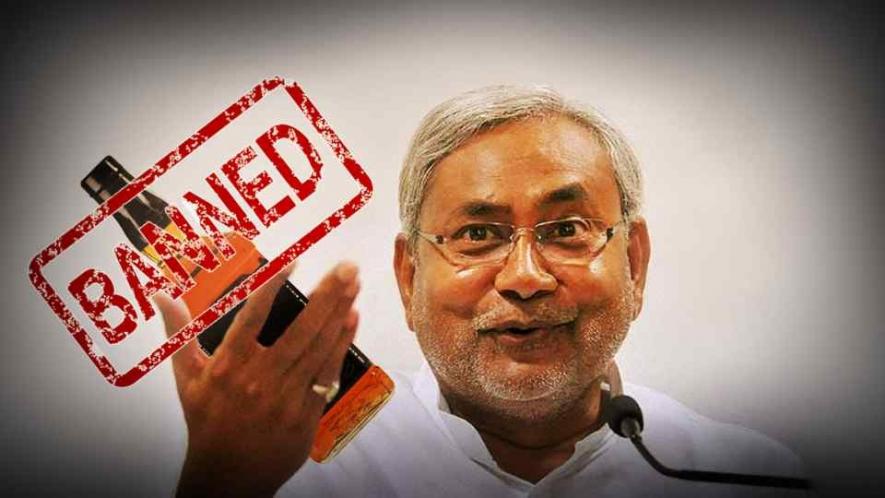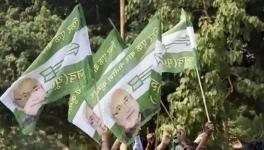Prohibition in Bihar: Marginalised Bear the Brunt of the Law

Image Coutesy: The Quint
According to a new report, the majority of those arrested on account of the liquor prohibition law in Bihar are from marginalised sections. The Indian Express report also shows that there has been a staggering total of 1,22,392 arrests due to this law, in the state.
The proportions of those from marginalised sections among those arrested are also disproportionate to their size in the population. Scheduled Castes (SCs) account for just 16 per cent of the population while their share among those arrested is 27.1 per cent and Scheduled Tribes (STs) account for just 1.3 per cent of the population, however, they comprise 6.8 per cent of those arrested.
Just last month, Chief Minister Nitish Kumar said that “it’s the poor people from SC, ST and OBC class who have been benefited the most”. However, these figures are in stark contrast to his claims.
The Bihar Director General of Police K S Dwivedi has been quoted as saying, “I have no knowledge of these figures, the Prisons department may have them. But I can say that there would always be a less number of affluent and upper castes in the group as police often find it convenient to conduct raids in open colonies and slums.”
This candid admission by a police official is only a disclosure of who this prohibition law has really been targeting. It is the marginalised, the poor and the working classes who have become victims of this law while the privileged, elite and politically powerful violate the prohibition law with impunity. Just this February, in Bihar, BJP leader Manoj Baitha mowed down and killed nine children while driving under the influence of liquor.
While it is true that the evil of alcoholism only furthers misery and economic impoverishment, prohibition has been a questionable tool in alleviating the situation.
Rather than dealing with a social problem through methods more suited, such as awareness campaigns and education, legal methods have been preferred as they are easier. In the guise of populism, to gain support, many state governments in India have attempted to deal with the social problem of alcoholism through the enactment of prohibition laws. However, the answer to the question of whether these measures have been effective remains disputed, at best, and a resounding negative in many cases.
In Bihar itself, it had been reported, in 2017, that out of 90,000 arrests, 95 per cent of those arrested were out on bail. What has also been reported is the growth of a bootlegging industry, fueled by the demand for liquor and also the increased prices, thanks to prohibition. Also, the prohibition law had resulted in as many as 1,58,727 criminal cases piling up with courts in the state. At the same time, smugglers have been using various ingenious ways to bring liquor across state borders to exploit the huge amount of profit to be made. The consumption of illicit liquor has also led to deaths of many.
In Gujarat, just last week, rupees one crore worth of liquor was destroyed by the police. Gujarat is a state which has enforced prohibition laws since its birth in 1960. Even here, there is a huge market for illicit liquor, which exposes the lack of effectiveness of a policy of prohibition.
Kerala too, which had earlier moved towards prohibition, has modified its policy. Instead of focusing on achieving complete prohibition, which was taking a toll on its revenue through tourism, the state has allowed five and three star hotels to serve alcohol by running bars while cheaper two star hotels can get permits only to serve beer and wine. Additionally, the government has raised the legal age for drinking to 23 from 21.
At the same time, in Andhra Pradesh, women have been fighting against the state’s new liquor policy since June. The demands put forward by the women include: a new policy, licenses given to the new shops be withdrawn, dry day once a week, the term of the license issued must be reverted to two years, the shops in residential areas and those in close proximity to schools, temples, railway stations and bus stations should be shut down, the areas which do not have any liquor shops should be kept the same way, a campaign must be conducted against the consumption of liquor and compensation should be paid to families whose members have lost their lives due to liquor consumption.
What the examples of Kerala and Andhra Pradesh show is that, rather than go for a simple legal move of having total prohibition, steps should be taken to make consumption of liquor more difficult so that the alcoholics are weaned off of liquor. At the same time, awareness campaigns and education coupled with policies to prevent the youth from taking to alcoholism should be made.
While saying this, it must not be discounted that there are many women’s movements across the country which have been demanding the implementation of prohibition. The fact is that it is the violence perpetrated by men under the influence of alcohol and the immiseration that it brings upon their families and not an elitist sense of morality that makes these women demand prohibition. These movements have brought about awareness and consciousness on alcohol abuse and also restrained state governments, which make huge revenues from the tax on sale, from pushing alcohol.
What can be clearly seen is that the prohibition law has been targeting the SCs, STs, OBCs and the working classes rather than actually benefiting them. It appears also to have encouraged a lucrative black market for smuggling and sale of liquor. Prohibition seems to be a hollow populist measure to gain support with the purported aim of fighting alcoholism, but in reality, appears to only have piled further misery on those it professes to benefit.
Get the latest reports & analysis with people's perspective on Protests, movements & deep analytical videos, discussions of the current affairs in your Telegram app. Subscribe to NewsClick's Telegram channel & get Real-Time updates on stories, as they get published on our website.
























